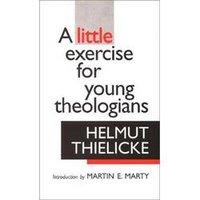
One book that I recommend to all who study theology (pastors, academics, etc.) is Helmut Thielicke’s A Little Exercise for Young Theologians
“At the risk of overstatement, I consider this short book to be one of the most meaningful and personally applicable that I have read. Thielicke’s clarity of thought and colorful expression led me into one of the most deeply convicting reading experiences of recent memory…. I can think of few books in the category of this one, which seemed to look with a penetrating gaze into my very life and gently rebuke me for the secret impurities and ‘gnostic pride’ that have long been locked away in my heart concealed behind doors of humble clichés and gentleness of speech.”
Well put. Thielicke particularly deals with the problem of pride in studying theology and of thinking that because one has studied certain issues he has mastered them. While upholding the value (indeed necessity) of theological study he punctures the arrogance which so easily arises.
Much could be said about this book, but I will simply point out that Thielicke does not merely give a warning. He gives sound advice for pursuing theological study in a devotional and relational manner, for uniting head and heart. He encourages engagement with the people of God and regular reading of the Scriptures. It is not fancy, but this is the way. Here are a few quotes.
“But it is all the more important to insist constantly and almost monotonously that a person who pursues theological courses is spiritually sick unless he reads the Bible uncommonly often and makes the most of opportunities by which, in preaching and Bible classes, that cornerstone is made visible.” (pg. 40)
“How all-important it is that a vigorous spiritual life, in close association with the Holy Scriptures and in the midst of the Christian community, be maintained as a background for theological work…” (pg. 37)
“…insofar as we are determined to be true theologians, we think within the community of God’s people, and for that community, and in the name of that community;--how shall I say?—we think as a part of the community itself…” (pgs.4-5)
Amen! He is no true theologian who does not work from within the church for the good of the church.



4 comments:
I, too, have been helped by this slender volume. Dr. Mohler required it for his Systematic Theology class. You're in good company.
Dr. Van Neste, when you say "He is no true theologian who does not work from within the church for the good of the church." What exactly does this mean? I have studied quite a bit regarding the original languages, theology, church history, Bible background, etc. I have a passion for these things, yet how do I know when to share my knowledge? Is it prideful to share without someone asking? Many times I mention an area of study with detail and it tends to become more of a hindrance than help in relationships. (either Christians don't care or feel this is "too much thinking"). I try and be careful to not be prideful or arrogant, but sharing what I've studied seems like it's counterproductive in relationships. Your comments on this? Does this make sense? I've struggled with this for sometime as a Christian and often wonder where I'm going wrong.
Coram Deo
Churchmouse,
Sorry for taking so long to reply. My point is that theology only makes sense in the context of the community of faith and the point of theology is to be of help to the community. It is not merely an individualistic endeavor. It is easier to isolate ourselves (in one sense), but you can never truly grasp the message of the bible in isolation.
This does nto mean we always have to speak up or share all we know. Rather it means that we are always asking how these truths apply to the church and how can the benfit of these truths best be communicated. We will need to look for the right place and the right way to speak. Sometimes we will fail by speaking out when we should not or by coming across a bit arrogant. Other tiems we will handle ourselves well but will be rejected by soem who do not see the value of thinking carefully about the faith. In these tiems we must persevere. God's truth is need by God's church and we persevere in the faith that He will use us as He sees fit.
Does that help?
Feel free to coem back with more specifics or to show me where I may have not addressed something you were asking.
A friend recommended this booklet to me back in Bible college - what a course correction - I has falling right into the typical sins of the student.
Post a Comment